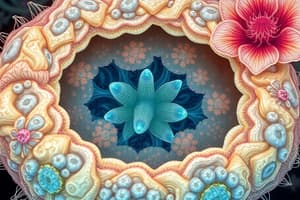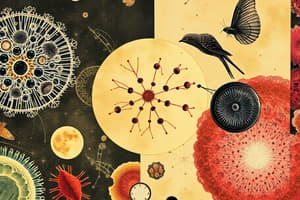Podcast
Questions and Answers
What is the main function of the cell wall in a plant cell?
What is the main function of the cell wall in a plant cell?
- Regulating gene expression
- Providing rigidity and protection (correct)
- Synthesizing new organelles
- Generating energy for the cell
Which cellular components are involved in the organization and movement of cellular components?
Which cellular components are involved in the organization and movement of cellular components?
- Cytoskeleton (correct)
- Endoplasmic reticulum
- Mitochondria
- Cell membrane
Which scientist made initial cell biology discoveries in the 17th century?
Which scientist made initial cell biology discoveries in the 17th century?
- Robert Hooke (correct)
- Louis Pasteur
- Anton van Leeuwenhoek
- Gregor Mendel
What serves as the building blocks of all living organisms?
What serves as the building blocks of all living organisms?
Which molecules are crucial for plant cells to withstand environmental challenges?
Which molecules are crucial for plant cells to withstand environmental challenges?
What is the strategy for cell division unique to plant cells?
What is the strategy for cell division unique to plant cells?
What is the process of cell division in plant cells where a new cell wall is synthesized?
What is the process of cell division in plant cells where a new cell wall is synthesized?
How have advances in molecular biology contributed to plant biology?
How have advances in molecular biology contributed to plant biology?
Which process involving the Golgi apparatus is critical for the synthesis of cell wall components?
Which process involving the Golgi apparatus is critical for the synthesis of cell wall components?
How can chronic stress from socioeconomic disadvantage impact cellular functions?
How can chronic stress from socioeconomic disadvantage impact cellular functions?
Flashcards are hidden until you start studying
Study Notes
Unraveling the Wonders of Cell Biology
The intricate dance of life unfolds at the microscopic level, where cells serve as the building blocks of all living organisms. The rich history of cell biology, dating back to Robert Hooke's initial discoveries in the 17th century, has played a pivotal role in shaping our understanding of the natural world.
Plant Cell Biology's Influence
Plant cell biology, in particular, has been a fertile ground for scientific discovery, with its unique structures and processes. For instance, plant cells have evolved a strategy for cell division called phragmoplast-assisted cell-plate formation, which differs from the animal cell's cytokinesis mechanism.
Cytoskeletal Regulation and Cell Wall Biology
The cytoskeleton, a complex network of protein filaments, plays an essential role in the organization and movement of cellular components. Plant cells exhibit distinct cytoskeletal structures, such as microtubules and actin filaments, which are involved in cell wall biology and cellular growth.
Membrane Trafficking and Cell Morphogenesis
Membrane trafficking, the selective movement of proteins and lipids between cellular compartments, is a critical process in plant cells. For example, the secretory pathway, involving the Golgi apparatus and vesicular transport, is necessary for the synthesis of cell wall components.
Cytokinesis and Cell Wall Formation
Plant cells carry out cell division through a process called cell plate formation, where a new cell wall is synthesized and the nucleus and organelles are distributed equally between the two daughter cells.
Ergosterol-like Lipids in Plant Membranes
Plant cells produce sterol-like molecules called ergosterol-like lipids, which function in membrane fluidity and stability. These lipids play a crucial role in the plant's ability to withstand environmental challenges.
The Role of Cell Walls in Plant Biology
The cell wall, a structural component exclusive to plant cells, provides rigidity and protection. Plant cell walls are composed of complex carbohydrates, such as cellulose, hemicelluloses, and pectins, which contribute to their resilience and adaptability.
Molecular Biology and Biotechnology
Advances in molecular biology have led to a better understanding of plant cell biology, contributing to the development of biotechnological tools and techniques. For example, the discovery of plant-specific microRNAs, which regulate gene expression, has provided insight into plant development and stress responses.
Cell Biology and Economic Inequality
In the broader context of biology, economic inequality has been shown to impact health, including the cellular level. Chronic stress from socioeconomic disadvantage can lead to cellular dysfunctions, such as inflammation and chromosomal aging.
As we continue to explore the depths of cellular biology, it becomes increasingly clear that the smallest units of life reveal the most profound insights about the natural world. By embracing the interdisciplinary nature of science, researchers are able to solve complex biological challenges and translate their discoveries into practical applications.
Studying That Suits You
Use AI to generate personalized quizzes and flashcards to suit your learning preferences.



